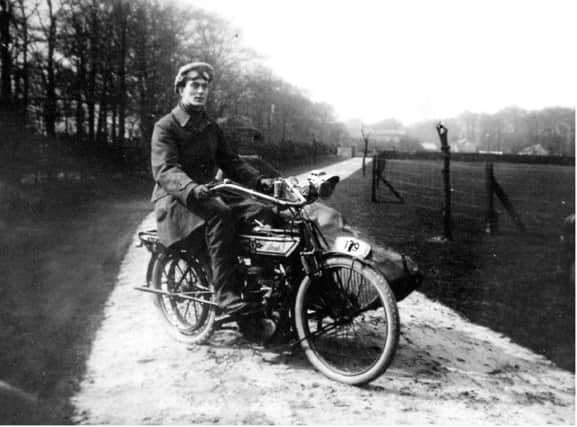Leeds soldier who fought in the Great War and became an MP


THERE was something different about James Milner.
In 1916, while many of those stuck in the rat-infested squalor of the trenches were simply concerned with their own survival, he was busy writing a letter asking to join the Labour Party.
From his dugout he wrote to the party secretary at the time, a man called Frank Fountain, and later explained the reason behind his action. “Seeing how the nation and all its activities were organised for war, why could not the nation be similarly organised for peace and greater prosperity and social justice for all?”
Advertisement
Hide AdAdvertisement
Hide AdIt was a pivotal moment in his life but Milner, who later spent more than 20 years as a Leeds MP, was not your typical Labour politician as Michael Meadowcroft, himself a former MP in the city, points out.
“He was the first middle class recruit to join the Labour Party in Leeds and that’s what first interested me about him,” says Meadowcroft, who researched Milner’s life as part of a series of talks he put together on prominent politicians in the city. “Although curiously the Labour Party never really took him to their hearts because of his background.”
Milner was born into a prosperous family in Scholes, a village outside Leeds, in 1889. His father was an Armley-based solicitor who also had a nose for business, buying a large tract of land in north Leeds which he earmarked for housing.
Despite his comfortable upbringing – he went to a good school and studied law at Leeds University – he became a committed socialist.
Advertisement
Hide AdAdvertisement
Hide AdHe also showed an interest in the army, having been in the Officer Training Corps both at school and university, so when war broke out in 1914 he was quick to volunteer, joining the Royal Army Service Corps (RASC).
Milner was involved in the fighting on the Western Front almost from the outset and went on to have a remarkable war record.
“He was a brave man because he was decorated with the Military Cross and bar for his service, which was very unusual,” says Meadowcroft. “In January 1916 he was awarded his first Military Cross which was presented to him by the King himself and he was also mentioned in despatches on two separate occasions.”
He served in France throughout the war and survived, although he didn’t escape unscathed. He took part in the Somme offensive during which he had a narrow escape.
Advertisement
Hide AdAdvertisement
Hide Ad“He came to in a shell hole only to find that the six companions he was with at the time were all dead, their bodies lying around him. It was actually a German soldier who came to his aid and looked after him.”
Despite having to endure such unimaginable horrors there were moments of levity and in between his acts of bravery he even found time to return home to Leeds to marry his fiancée, Lois Tinsdale.
He rose to the rank of captain but was captured in May 1918 and sent to the Rastatt prisoner of war camp in Germany.
A couple of months later he and a fellow prisoner, a South African army captain, managed to escape. “The South African gave himself up after eight days because he was too exhausted to continue, but Milner kept going along a river. He thought he’d reached Switzerland but unfortunately he had misjudged the distance and was recaptured just a mile away from the Swiss border and was sent back.
Advertisement
Hide AdAdvertisement
Hide Ad“He later wrote about his attempted escape from the camp in lurid detail and to have that account is fascinating,” says Meadowcroft. “He was in a prisoner of war camp when the Armistice was declared in 1918 and it was some weeks before he was released and able to return to England.”
After the war Milner became a councillor in his home city before being elected MP for Leeds South-East in 1929. He went on to become Deputy Speaker of the House of Commons and remained an MP until 1951 when he became a Labour peer.
“Because he wasn’t the normal run-of-the-mill Labour type he was always seen as a bit distant,” says Meadowcroft. “He had this big house where they had garden parties which didn’t quite fit with Labour’s image.”
Nevertheless he was a prominent figure in the city’s political landscape during the first half of the 20th century and his family still have close links to the area. “He was very much a Leeds man, from a Leeds family who served as an MP in the city for all that time,” says Meadowcroft.
Advertisement
Hide AdAdvertisement
Hide AdAlthough Milner had survived the Great War it came at a cost. He never fully recovered from a leg wound he suffered and in 1961 he had to have it amputated. He became a Freeman of Leeds in 1966 but was too ill to attend the ceremony and died the following year.
It sounds like a sad end but, as Meadowcroft points out, he led a remarkable life. “It was his background that intrigued me and also the fact that he’d written this letter from the trenches. I mean fancy sitting down on the Western Front to write a letter to the Labour Party saying, ‘I want to join.’ They must have been quite surprised.
“The other thing, of course, is that the majority of the Leeds Labour Party at the time were pacifists. There was a great battle, as there was nationally, going on between the two sides.”
Like so many of his generation, though, his life was irrevocably changed by the war. “You wonder sometimes why those First World War survivors like Jim didn’t talk about their experiences, but what could he tell people back in Leeds? How could you explain what it was like?”